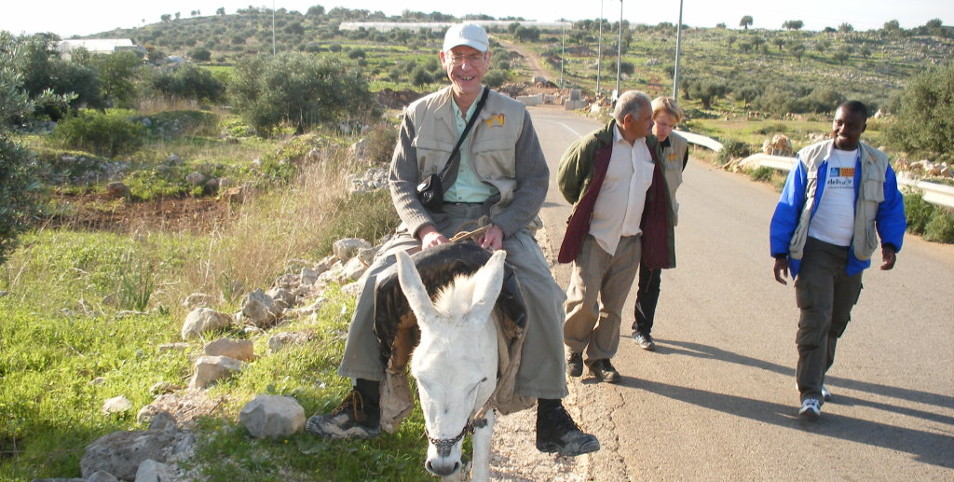Well – I’ve heard all the theory, but now I’ve seen the reality. Today I drank coffee with a beleaguered Palestinian family in East Jerusalem. The Al-Kurd family are currently forbidden by a court order to occupy the front part of their house, and an Israeli settler family has moved in there.
Before I go on, some explanation. Some of you know that I have come to the West Bank for three months with the Ecumenical Accompaniment Programme in Palestine and Israel (details below). After a few days spent in Jerusalem, I shall be based in Tulkarem, a Palestinian town (pop 60,000) in the NW of the West Bank. Why will I be in Tulkarem? And what will I be doing? I will be answering these questions in future
emails. This email is an introduction and an opportunity to make contact. If you would prefer not to receive future emails, please let me know. Equally if you know anyone who would like to receive them, just ask them to email me. Thank you.
Now some background. The West Bank is Palestinian territory but has been under illegal Israeli occupation since 1967. One aspect of this Occupation is the removal of thousands of Palestinian people from their homes to make room for Israeli settlements to be built. These settlements are illegal in international law.
The Al-Kurd family expect to be evicted totally very soon. Sadly this is not the first time the family has had to abandon their home. In 1948, following the Arab-Israeli war, they were driven out of their home in Haifa. But in 1953 the UN provided a new home for them (and some others like them) in Sheikh Jarrah, on condition that they gave up their refugee status. They agreed, and have lived in the house ever since. But recently an Israeli settler group went to court and used documents from the Ottoman era to “prove” that the land had been owned by Jews before 1948, and so the Al-Kurds ought to pay rent. The family refused and the
result is the current impossible situation. Sadly this is all part of a plan by the Jerusalem Municipality to change the demography of the Sheikh Jarrah area of Jerusalem so that it will cease to be a Palestinian area and will become home for about 540 Jewish settler families.
It is tragic and ironic that Jewish Israelis can claim a “right to return” to
Palestinian land supposedly owned by Jews over a hundred years ago, but Palestinians cannot claim any similar right to return to land which they owned before the 1948 war, but which is now within Israel.
I watched helplessly as the settlers moved freely in and out of the Al-Kurds’ front door. All around was strewn an array of the Al-Kurds’ possessions that had been thrown out onto the front lawn. (See the attached pictures.) Other local Palestinian families have been evicted and their houses are now festooned with blue and white Israeli flags. It seems nothing can stop this madness.
Enough for now. Thank you for reading this far. Do please get in touch. I look at my email more often than my blog, so to make sure I get a message quickly, send it to peter@balaam.plus.com rather than posting it. Thanks.
With best wishes,
Peter Balaam
What is EAPPI? EAPPI monitors human rights abuses on both sides of the conflict and also campaigns for an end to the Israeli occupation of Palestinian territories, believing that it is bad for both Israelis and Palestinians. In practice, what EAPPI does is to send volunteers to Israel and the Occupied Palestinian Territories. What these volunteers do is 1. offer protection through non-violent presence 2. monitor and report violations of human rights and international humanitarian law by either Israelis or Palestinians 3. support Israeli and Palestinian peace activists 4. undertake advocacy work including public speaking in the UK This involves living in the West Bank or East Jerusalem and undertaking activities such as 1. standing at checkpoints to try to reduce the abuse of Palestinian civilians and help them gain access to their land, jobs, education or medical facilities 2. escorting Palestinian children to school in the face of harassment by extremist Jewish settlers. 3. joining Israeli and Palestinian peace groups in peaceful demonstrations, protesting about the occupation or about house demolitions etc. 4. writing regular reports about what is observed. These may be used in advocacy work with, eg, politicians and others in the UK. I work for Quaker Peace and Social Witness as an Ecumenical Accompanier serving on the World Council of Churches’ Ecumenical Accompaniment Programme in Palestine and Israel (EAPPI). The views contained in this email are personal and do not necessarily reflect those of my employer (QPSW) or the WCC. If you would like to publish the information contained here (including posting it on a website) or distribute it further, please first contact the QPSW Programme Manager for Israel/OPT teresap@quaker.org.uk for permission. Thank you.
